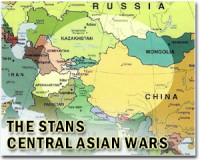| . |  |
. |
Miranshah, Pakistan (AFP) Jan 12, 2011 A US missile attack killed at least three militants in Pakistan's North Waziristan tribal district on Wednesday, security officials said. Missiles struck a compound at Haiderkhel village, some 25 kilometers (15 miles) east of Miranshah, the main town of North Waziristan tribal district bordering Afghanistan, three security officials said. "A US drone fired two missiles at a militant compound. At least three militants were killed and two others were injured," a senior Pakistani security official told AFP. The identities of the dead militants were not immediately clear, but local intelligence officials said they were "foreigners", a term used for Taliban and Al-Qaeda linked non-Pakistani Arab and Central Asian militants. "They were foreigners," an intelligence official told AFP, adding they were checking on the nationalities. The area is a stronghold of Taliban commander Hafiz Gul Bahadur. Washington says wiping out the militant threat in Pakistan's semi-autonomous tribal belt is vital to winning the nine-year war against the Taliban in Afghanistan and defeating Al-Qaeda. Militant networks in North Waziristan are accused of escalating the nine-year war in Afghanistan and US officials want Pakistan to launch a ground offensive in the district to limit the Islamist threat. The United States does not confirm drone attacks, but its military and the Central Intelligence Agency operating in Afghanistan are the only forces that deploy the unmanned aircraft in the region. In 2010 the campaign doubled missile attacks in the tribal area with around 100 drone strikes killing more than 650 people, according to an AFP tally. Pakistan tacitly cooperates with the bombing campaign, which US officials say has severely weakened Al-Qaeda's leadership, but has stalled on launching a ground offensive in North Waziristan, saying its troops are overstretched.
earlier related report President Hamid Karzai dispatched the delegation, led by one of his advisers, to assess damage caused by Operation Omaid, which started in April and aims to root out the Taliban in Kandahar, a traditional heartland areas. The delegation then reported to the Western-backed leader, charging that the damage caused by the military offensive was worth over 100 million dollars, in part due to damage to crops, Karzai's office said in a statement. International Security Assistance Force (ISAF) spokesman Brigadier-General Josef Blotz said he could not comment as he had not yet seen the statement. "As a result of military operation 'Omaid', significant property damage has been caused to the people in Arghandab, Zahri and Panjwayi districts in Kandahar province," the delegation's statement said. "The operation was launched during harvest season and the damage caused to property and crops has cost more than 100 million dollars," it added the delegation had told Karzai. Kandahar's economy is heavily reliant on agriculture and the province is known for its pomegranates, grapes and wheat. "The military forces have destroyed lots of houses and orchards for unknown reasons, leading to the displacement of lots of people," the statement said, citing what the delegation told Karzai. "Besides destroying lots of houses, numerous fruit trees... lots of grape-drying houses and orchard walls have also been destroyed," it added. Zalmai Ayoubi, a Kandahar provincial spokesman, told AFP that militants had planted improvised bombs in abandoned homes and orchards, leaving the soldiers no other option but to destroy them. "It wasn't possible to defuse the bombs so the soldiers had to blow them up where they were planted," Ayoubi said, adding foreign forces had told local officials that villagers would be compensated once an assessment had been carried out. The delegation's statement added that they had urged Karzai "to urgently raise the issue with NATO forces and find a solution". Operation Omaid -- Dari for "hope" -- is the biggest military offensive by the NATO-led international force since the start of the war in 2001. It centres on Kandahar, a flashpoint of the Taliban insurgency, and aims to drive the militant Islamists out of villages ahead of the planned start of conditions-based withdrawals of international troops in July. The statement, citing the delegation, said the offensive had "improved security in Kandahar" where the Taliban originated before sweeping to power in the rest of the country in the 1990s.
Share This Article With Planet Earth
Related Links News From Across The Stans
 In Afghanistan, US troops hope for winter breakthrough
In Afghanistan, US troops hope for winter breakthroughBangi, Afghanistan (AFP) Jan 11, 2011 US Army Captain Aaron Schwengler removes his helmet and smiles as he sits down for tea with elders in an Afghan village. "It's always nice to come here because we don't get shot at," he tells them. Boys in Bangi, located in southeast Afghanistan's troubled Ghazni province, watch over a dirt wall as Schwengler sits cross-legged on a rug near a bleating goat, telling the elders why he is visit ... read more |
|
| The content herein, unless otherwise known to be public domain, are Copyright 1995-2010 - SpaceDaily. AFP and UPI Wire Stories are copyright Agence France-Presse and United Press International. ESA Portal Reports are copyright European Space Agency. All NASA sourced material is public domain. Additional copyrights may apply in whole or part to other bona fide parties. Advertising does not imply endorsement,agreement or approval of any opinions, statements or information provided by SpaceDaily on any Web page published or hosted by SpaceDaily. Privacy Statement |